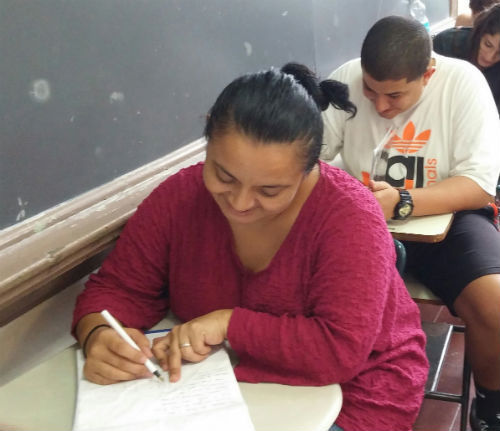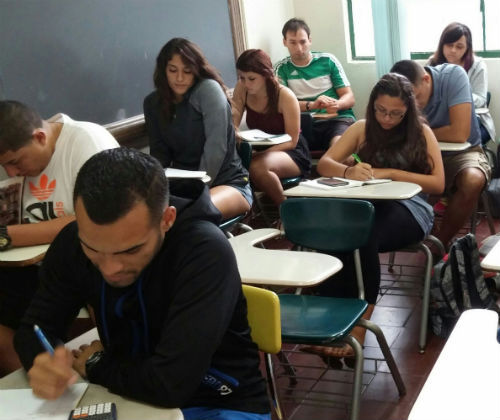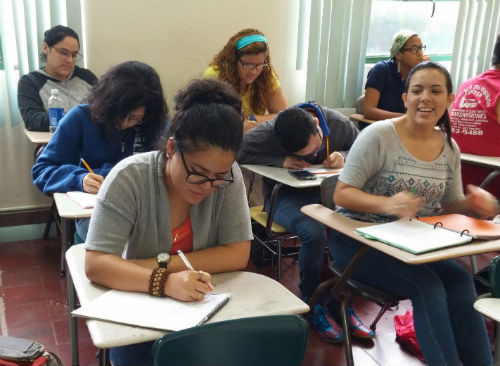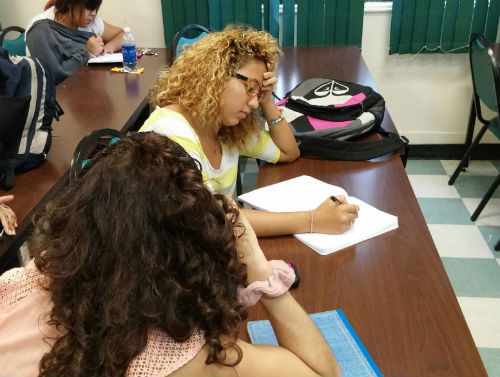
"Prompted by the Global Search for Education series, a survey was designed and responses were obtained from 53 female and 78 male students at the University of Puerto Rico, Mayagüez campus, with the aim of exploring gender perceptions."
-- Hector Rosario and Dan McGee
When gender perceptions and negative stereotypes towards women in mathematics and science are non-existent, the gender gap in performance seems to disappear. That's the lesson to be learned from not just Finland, but also Puerto Rico where females are performing as well as males and better than males in some math and science subjects.
What we in the mainland US could do to improve girls' image of themselves and boys' image of girls would seem to be the next important question. I invited Dr. Hector Rosario and Daniel McGee to share their fascinating research and perspectives on this topic in The Global Search for Education. Hector Rosario is a professor of mathematics at the University of Puerto Rico (Mayagüez) and holds a Ph.D. from Columbia University. He is a co-editor of Mathematics and Its Teaching in the Southern Americas, an anthology of the history of mathematics education in 17 nations in the Americas. Daniel McGee worked 18 years at the UPR-Mayaguez where he directed numerous projects involving developmental mathematics, high school mathematics, pre-service teacher training and materials for Pre-Calculus and Calculus classes. He is currently director of the Kentucky Center for Mathematics.

"There is clearly no evidence with this population to indicate that fathers are considered more intelligent or more talented in math and science than mothers."
-- Hector Rosario and Dan McGee
What is the status of the gender gap in Puerto Rico regarding Math and Science achievement and how does this compare to the U.S.?
The following quote appears in the chapter on Puerto Rico of the recently released anthology Mathematics and Its Teaching in the Southern Americas.
What do you believe are the primary factors driving this improved gender equality?
There is evidence supporting gender perceptions and negative stereotypes as major contributors to the gender gap in mathematics and science in the United States.
As a similarly large gender gap is not found in Puerto Rico, a good first step is to look at Puerto Rican perceptions of women in science and mathematics.
Prompted by the Global Search for Education series, a survey was designed and responses were obtained from 53 female and 78 male students at the University of Puerto Rico, Mayagüez campus, with the aim of exploring gender perceptions.
When remembering their childhood, boys tended to remember thinking that boys were more intelligent, harder working, and better at math and science than girls, while girls remembered thinking that girls were more intelligent, harder working, and better at math and science than boys.
Perhaps the most telling indicator of student gender perceptions related to how they perceive their parents.
There is clearly no evidence with this population to indicate that fathers are considered more intelligent or more talented in math and science than mothers.
However, there is an overwhelming perception that mothers are harder working - a sentiment especially strong in boys.
So there appear to be neither discouraging gender perceptions nor negative stereotypes among college-bound boys and girls in Puerto Rico. This would certainly support previous research indicating that these are major factors behind the gender gap in the United States. U.S. Information

"It would seem that the US could have a large return if it invests in improving girls' image of themselves and boys' image of girls as mathematically and scientifically capable of climbing equally great heights." -- Hector Rosario and Dan McGee
What, if any, specific strategies were used to improve girls' performance in mathematics? Are there any plans to build on this success?
While a difficult strategy to replicate, the universality of hard-working moms seems to have changed cultural perceptions among college-bound children - particularly among male students who, interestingly enough, seemed to take negative gender perceptions very personally. In an open comment section of the survey, boys were very prone to speak almost movingly of women scientists and mathematicians that influenced their lives. Girls, on the other hand, appear to be influenced by strong women in their family that have told them of past injustice and instilled the determination to study the career they wish to follow.
What can the rest of the United States learn from the Puerto Rican example?
When neither men nor women buy into gender perceptions and negative stereotypes towards women in mathematics and science, the gender gap seems to naturally diminish. Hence, it would seem that the US could have a large return if it invests in improving girls' image of themselves and boys' image of girls as mathematically and scientifically capable of climbing equally great heights.
(All pictures are courtesy of Hector Rosario)
Join me and globally renowned thought leaders including Sir Michael Barber (UK), Dr. Michael Block (U.S.), Dr. Leon Botstein (U.S.), Professor Clay Christensen (U.S.), Dr. Linda Darling-Hammond (U.S.), Dr. MadhavChavan (India), Professor Michael Fullan (Canada), Professor Howard Gardner (U.S.), Professor Andy Hargreaves (U.S.), Professor Yvonne Hellman (The Netherlands), Professor Kristin Helstad (Norway), Jean Hendrickson (U.S.), Professor Rose Hipkins (New Zealand), Professor Cornelia Hoogland (Canada), Honourable Jeff Johnson (Canada), Mme. Chantal Kaufmann (Belgium), Dr. EijaKauppinen (Finland), State Secretary TapioKosunen (Finland), Professor Dominique Lafontaine (Belgium), Professor Hugh Lauder (UK), Professor Ben Levin (Canada), Lord Ken Macdonald (UK), Professor Barry McGaw (Australia), Shiv Nadar (India), Professor R. Natarajan (India), Dr. Pak Tee Ng (Singapore), Dr. Denise Pope (US), Sridhar Rajagopalan (India), Dr. Diane Ravitch (U.S.), Richard Wilson Riley (U.S.), Sir Ken Robinson (UK), Professor PasiSahlberg (Finland), Professor Manabu Sato (Japan), Andreas Schleicher (PISA, OECD), Dr. Anthony Seldon (UK), Dr. David Shaffer (U.S.), Dr. Kirsten Sivesind (Norway), Chancellor Stephen Spahn (U.S.), Yves Theze (LyceeFrancais U.S.), Professor Charles Ungerleider (Canada), Professor Tony Wagner (U.S.), Sir David Watson (UK), Professor Dylan Wiliam (UK), Dr. Mark Wormald (UK), Professor Theo Wubbels (The Netherlands), Professor Michael Young (UK), and Professor Minxuan Zhang (China) as they explore the big picture education questions that all nations face today.
The Global Search for Education Community Page
C. M. Rubin is the author of two widely read online series for which she received a 2011 Upton Sinclair award, "The Global Search for Education" and "How Will We Read?" She is also the author of three bestselling books, including The Real Alice in Wonderland, is the publisher of CMRubinWorld, and is a Disruptor Foundation Fellow.


